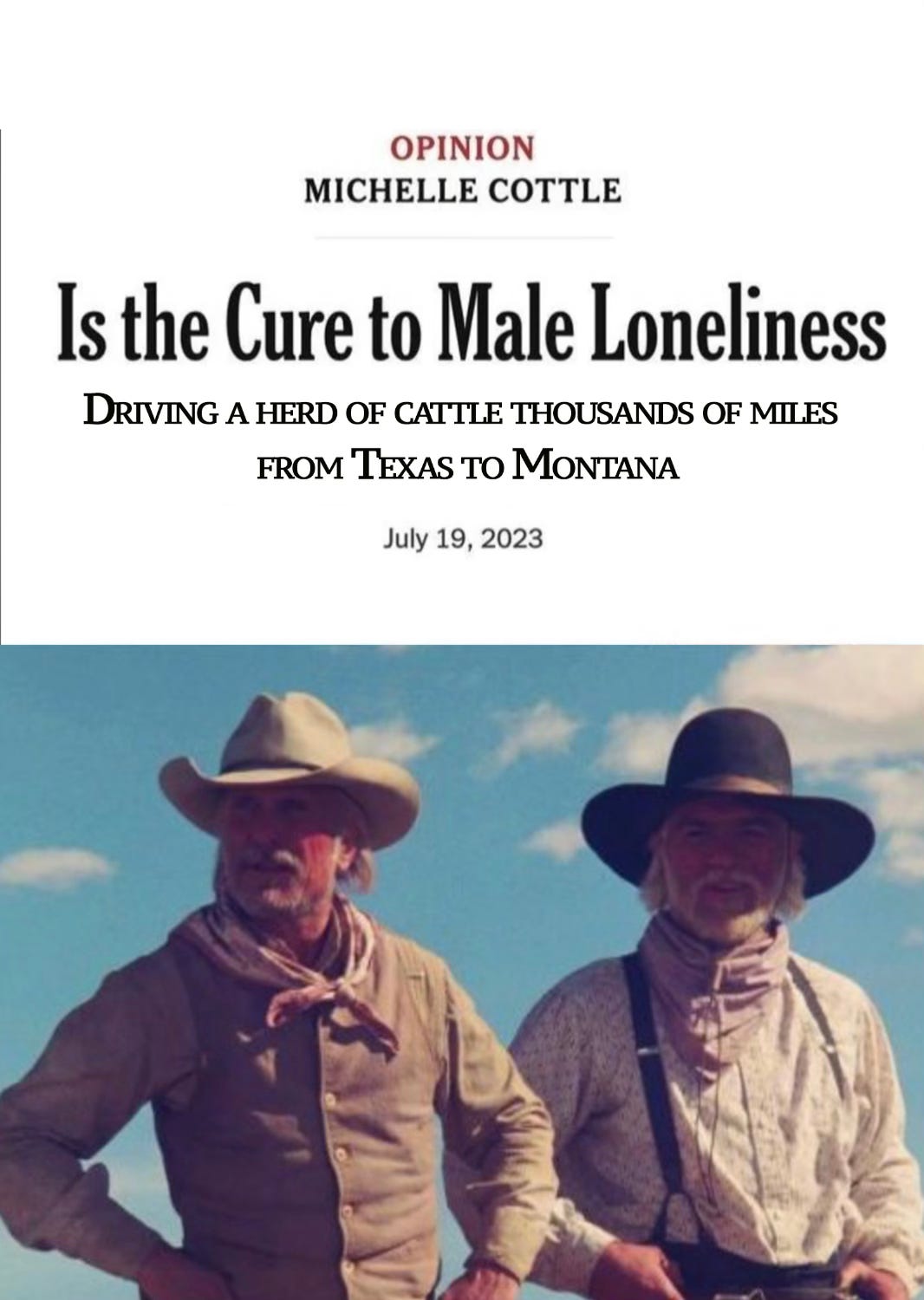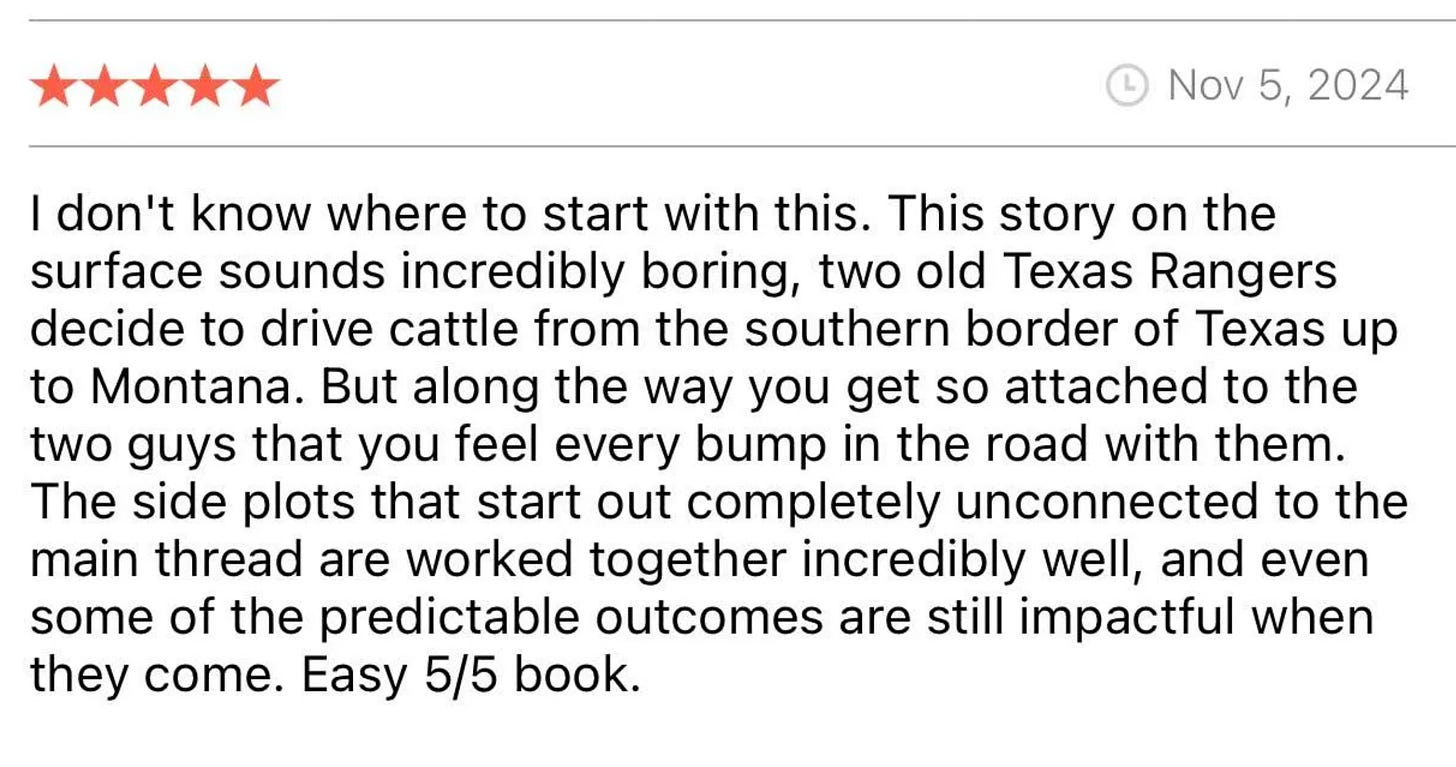“I’m sorry you and Gus McCrae ever met. All you two done was ruin one another, not to mention those close to you. Another reason I didn’t marry him was because I didn’t want to fight you for him every day of my life. You men and your promises: they’re just excuse to do what you plan to do anyway, which is leave. You think you’ve always done right—that’s your ugly pride, Mr. Call. But you never did right and it would be a sad woman that needed anything from you. You’re a vain coward, for all your fighting. I despised you then, for what you were, and I despise you now, for what you’re doing.”
Lonesome Dove, Larry McMurtry
This novel has made it into my top five all time favorites. Not an easy feat to do, nor one that I expected when I originally started this. Lonesome Dove is a long novel, coming in at 855 pages or about 40 hrs of narration if you go the audiobook route. I would like to add that the Lee Horsely narration is something quite special actually, and probably one of my finer experiences with an audiobook.
Both of my brothers who regularly devour audiobooks due to the nature of their jobs urged me to read it. And so I finally did. A bit of a side-note on the whole men don’t read (listen) thing… it would blow your mind the amount of blue collar men that spend all day in a truck or tractor that devour audiobooks. Bernard Cornwell, Louis L’Amour, and Larry McMurtry are all getting piped into the cabs of John Deere tractors and Peterbilt trucks everyday. Louis L’Amour pretty famously expanded into audiobooks and radio plays early on, before audible was ever a thing, and I wonder if that wasn’t a bit of marketing genius—meeting his target audience in the cabs of their pickups.
The novel is not your typical pulp western paperback with its tight plot and 60k word pacing. It is long and literary and written with third-person omniscient that hops from head to head of each of the characters. Whole chapters are dedicated to talks around the campfire and character backstory. The entire thing is character driven. It is in a sense, the ultimate “hangout” novel. This book was actually one of the things that helped click into place some of the things I wrote about in last week’s essay about the adventure genre.
The story follows Augustus McCrae and Woodrow F. Call, two retired Texas Rangers, and a small cast of characters on a cattle drive from Texas to Montana. It starts in the dusty one horse whore town of Lonesome Dove. Gus spends his time lounging on the porch getting his drunk on and starting friendly arguments with Call the outfit’s stern workhorse. Meanwhile, Call spends his time trying to break a Kiowa mare affectionately dubbed the Hell Bitch. Rounding out the rest of the main crew is Pea Eye, Newt, and Deetz. And then there is Lori, the only sporting woman in town, who wants to leave Lonesome Dove and go to San Francisco, but has no real way out of her present situation.
Now the first quarter of the book sees all the character’s thoroughly introduced and takes a while to do it. So long in fact, that when Jake Spoon blows into town talking about how good grazing in Montana supposedly is you don’t really realize that you’ve just hit the inciting incident. Thus, the crew, who haven’t seen Jake Spoon in about ten years, soon find out that he’s on the run from the law in Arkansas. Call, much to Gus chagrin, then gets it in his head that he wants to be one of the first men to run cattle in Montana. So the gang run a cattle raid into Mexico and steal away a few thousand head from their nemesis Pedro Flores, a Mexican rancher, bandit, and cattle rustler.
Jake Spoon, a perennial womanizer, takes up with Lori who then stops selling pokes to the rest of the town. Subsequently, Gus instigates both of them into going along on the cattle drive, mostly because he knows how much it will irritate both Call and Jake.
I think that’s enough plot, although I likely shouldn’t concern myself as it’s been out for 40 years and was turned into one of your uncle’s favorite miniseries. There will be minor spoilers ahead.
Gus and Call are both tough as nails and down to scrap. You have this sense about them, but don’t really get to see what they are capable of until halfway through the book, and then it’s in some of the best western action writing I’ve ever read.
McMurtry pretty famously intended Lonesome Dove to subvert the western. And at times you catch a whiff of that, but you are having so much fun hanging out with these two bad-ass Texas Rangers that you forget about it moments later.
According to The New Yorker’s story, McMurtry had a complicated relationship with the book because a television adaptation in 1989 starring Robert Duvall and Tommy Lee Jones paved over many of the anti-western themes. “McMurtry began comparing his most popular book to ‘Gone with the Wind,’” The New Yorker’s Rachel Monroe wrote. “He didn’t mean it as a compliment.”
https://www.esquire.com/entertainment/books/a64177557/lonesome-dove-book-popularity-2025/
I mean, even the ol’ mossy horn bull gets a nice end to his character arc by fighting a grizzly, winning, and living to wear the battle scars. If McMurtry wanted people to be down on the west, the cowboy, and the western myth, he shouldn’t have written one of the coolest things ever. It really is similar to Dune in that way, the characters and the heroes all kind of get away from McMurtry and do exactly what they want and what the story demands. Which is of course why it's a masterpiece, because good art hunts down the truth and transcends the pettiness of our souls, whether that be the authors or the audience.
Another example of this heroic center, is when Gus and Call track down an outlaw gang that goes about murdering and thieving from innocent folk. They reminded me of the Glanton gang from Blood Meridian to be honest. Perhaps not as effective, but easily as wanton in their appetite for violence. Regardless, the outcome makes me think that Gus and Call probably would’ve mogged the Judge and sent him dancing on into hell if Blood Meridian had taken place about forty years later.
But this book isn’t just testosterone and action. There were more than a few moments that will both break your heart and warm it, often at the same time. Gus’s evolving relationship with Lori might be one of the finer love stories ever put on paper. Then there is a certain visit one of the characters receives from the ghost of his former companion. Or when Call finally gives Newt his horse but can’t bring himself to give him anything else. All of the cowboys are deeply human, and all of them struggle with fears, anxieties, dreams, ghosts, and unrequited loves.
Pea Eye, the tallest man in the group, had developed a new fear, which was that he would be swallowed up in a snowdrift. He had always worried about quicksand, and now he was in a place where all he could see, for miles around, was a colder version of quicksand.
Lonesome Dove, Larry McMurtry
This book made me tear up a few times, and the final chapters might be one of the all time greatest odes to brotherhood, camaraderie, and friendship that has ever been written. The final adventure that Gus sends Call of on is both cruel joke and grail quest. It will weigh heavy on your mind and heart for weeks after you set the book down.
All this tends to get back to my point last week, that a good adventure is really about the journey, and nothing drives that point home more clearly than the end of Lonesome Dove.
Finally, I did watch the mini-series with Robert Duvall and Tommy Lee Jones once I finished the book, and I loved it. I am also thankful that I got to experience the book first and then the miniseries and recommend you do that as well should you still have the option.







It’s so awesome that this book has been rediscovered by so many that it even got written up on Esquire. I read in college back in 1987 (it was part of the curriculum for a Southwestern Literature class) and it just grabbed me and to this day has not let me go.
Read it last summer. It quickly became not only one of my favorite Westerns, but favorite books period.